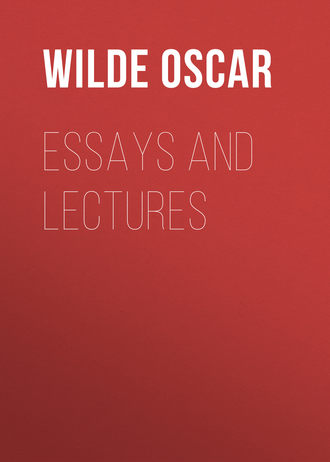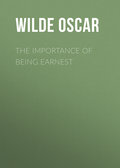
Оскар Уайльд
Essays and Lectures
The general method of historical criticism pursued by Thucydides having been thus indicated, it remains to proceed more into detail as regards those particular points where he claims for himself a more rational method of estimating evidence than either the public or his predecessors possessed.
‘So little pains,’ he remarks, ‘do the vulgar take in the investigation of truth, satisfied with their preconceived opinions,’ that the majority of the Greeks believe in a Pitanate cohort of the Spartan army and in a double vote being the prerogative of the Spartan kings, neither of which opinions has any foundation in fact. But the chief point on which he lays stress as evincing the ‘uncritical way with which men receive legends, even the legends of their own country,’ is the entire baselessness of the common Athenian tradition in which Harmodios and Aristogeiton were represented as the patriotic liberators of Athens from the Peisistratid tyranny. So far, he points out, from the love of freedom being their motive, both of them were influenced by merely personal considerations, Aristogeiton being jealous of Hipparchos’ attention to Harmodios, then a beautiful boy in the flower of Greek loveliness, while the latter’s indignation was aroused by an insult offered to his sister by the prince.
Their motives, then, were personal revenge, while the result of their conspiracy served only to rivet more tightly the chains of servitude which bound Athens to the Peisistratid house, for Hipparchos, whom they killed, was only the tyrant’s younger brother, and not the tyrant himself.
To prove his theory that Hippias was the elder, he appeals to the evidence afforded by a public inscription in which his name occurs immediately after that of his father, a point which he thinks shows that he was the eldest, and so the heir. This view he further corroborates by another inscription, on the altar of Apollo, which mentions the children of Hippias and not those of his brothers; ‘for it was natural for the eldest to be married first’; and besides this, on the score of general probability he points out that, had Hippias been the younger, he would not have so easily obtained the tyranny on the death of Hipparchos.
Now, what is important in Thucydides, as evinced in the treatment of legend generally, is not the results he arrived at, but the method by which he works. The first great rationalistic historian, he may be said to have paved the way for all those who followed after him, though it must always be remembered that, while the total absence in his pages of all the mystical paraphernalia of the supernatural theory of life is an advance in the progress of rationalism, and an era in scientific history, whose importance could never be over-estimated, yet we find along with it a total absence of any mention of those various social and economical forces which form such important factors in the evolution of the world, and to which Herodotus rightly gave great prominence in his immortal work. The history of Thucydides is essentially one-sided and incomplete. The intricate details of sieges and battles, subjects with which the historian proper has really nothing to do except so far as they may throw light on the spirit of the age, we would readily exchange for some notice of the condition of private society in Athens, or the influence and position of women.
There is an advance in the method of historical criticism; there is an advance in the conception and motive of history itself; for in Thucydides we may discern that natural reaction against the intrusion of didactic and theological considerations into the sphere of the pure intellect, the spirit of which may be found in the Euripidean treatment of tragedy and the later schools of art, as well as in the Platonic conception of science.
History, no doubt, has splendid lessons for our instruction, just as all good art comes to us as the herald of the noblest truth. But, to set before either the painter or the historian the inculcation of moral lessons as an aim to be consciously pursued, is to miss entirely the true motive and characteristic both of art and history, which is in the one case the creation of beauty, in the other the discovery of the laws of the evolution of progress: Il ne faut demander de l’Art que l’Art, du passé que le passé.
Herodotus wrote to illustrate the wonderful ways of Providence and the nemesis that falls on sin, and his work is a good example of the truth that nothing can dispense with criticism so much as a moral aim. Thucydides has no creed to preach, no doctrine to prove. He analyses the results which follow inevitably from certain antecedents, in order that on a recurrence of the same crisis men may know how to act.
His object was to discover the laws of the past so as to serve as a light to illumine the future. We must not confuse the recognition of the utility of history with any ideas of a didactic aim. Two points more in Thucydides remain for our consideration: his treatment of the rise of Greek civilisation, and of the primitive condition of Hellas, as well as the question how far can he be said really to have recognised the existence of laws regulating the complex phenomena of life.
III
The investigation into the two great problems of the origin of society and the philosophy of history occupies such an important position in the evolution of Greek thought that, to obtain any clear view of the workings of the critical spirit, it will be necessary to trace at some length their rise and scientific development as evinced not merely in the works of historians proper, but also in the philosophical treatises of Plato and Aristotle. The important position which these two great thinkers occupy in the progress of historical criticism can hardly be over-estimated. I do not mean merely as regards their treatment of the Greek Bible, and Plato’s endeavours to purge sacred history of its immorality by the application of ethical canons at the time when Aristotle was beginning to undermine the basis of miracles by his scientific conception of law, but with reference to these two wider questions of the rise of civil institutions and the philosophy of history.
And first, as regards the current theories of the primitive condition of society, there was a wide divergence of opinion in Hellenic society, just as there is now. For while the majority of the orthodox public, of whom Hesiod may be taken as the representative, looked back, as a great many of our own day still do, to a fabulous age of innocent happiness, a bell’ età dell’ auro, where sin and death were unknown and men and women were like Gods, the foremost men of intellect such as Aristotle and Plato, Æschylus and many of the other poets 1 saw in primitive man ‘a few small sparks of humanity preserved on the tops of mountains after some deluge,’ ‘without an idea of cities, governments or legislation,’ ‘living the lives of wild beasts in sunless caves,’ ‘their only law being the survival of the fittest.’
And this, too, was the opinion of Thucydides, whose Archæologia as it is contains a most valuable disquisition on the early condition of Hellas, which it will be necessary to examine at some length.
Now, as regards the means employed generally by Thucydides for the elucidation of ancient history, I have already pointed out how that, while acknowledging that ‘it is the tendency of every poet to exaggerate, as it is of every chronicler to seek to be attractive at the expense of truth,’ he yet assumes in the thoroughly euhemeristic way, that under the veil of myth and legend there does yet exist a rational basis of fact discoverable by the method of rejecting all supernatural interference as well as any extraordinary motives influencing the actors. It is in complete accordance with this spirit that he appeals, for instance, to the Homeric epithet of ἀφνειός, as applied to Corinth, as a proof of the early commercial prosperity of that city; to the fact of the generic name Hellenes not occurring in the Iliad as a corroboration of his theory of the essentially disunited character of the primitive Greek tribes; and he argues from the line ‘O’er many islands and all Argos ruled,’ as applied to Agamemnon, that his forces must have been partially naval, ‘for Agamemnon’s was a continental power, and he could not have been master of any but the adjacent islands, and these would not be many but through the possession of a fleet.’
Anticipating in some measure the comparative method of research, he argues from the fact of the more barbarous Greek tribes, such as the Ætolians and Acarnanians, still carrying arms in his own day, that this custom was the case originally over the whole country. ‘The fact,’ he says, ‘that the people in these parts of Hellas are still living in the old way points to a time when the same mode of life was equally common to all.’ Similarly, in another passage, he shows how a corroboration of his theory of the respectable character of piracy in ancient days is afforded by ‘the honour with which some of the inhabitants of the continent still regard a successful marauder,’ as well as by the fact that the question, ‘Are you a pirate?’ is a common feature of primitive society as shown in the poets; and finally, after observing how the old Greek custom of wearing belts in gymnastic contests still survived among the more uncivilised Asiatic tribes, he observes that there are many other points in which a likeness may be shown between the life of the primitive Hellenes and that of the barbarians to-day.’
As regards the evidence afforded by ancient remains, while adducing as a proof of the insecure character of early Greek society the fact of their cities 2 being always built at some distance from the sea, yet he is careful to warn us, and the caution ought to be borne in mind by all archæologists, that we have no right to conclude from the scanty remains of any city that its legendary greatness in primitive times was a mere exaggeration. ‘We are not justified,’ he says, ‘in rejecting the tradition of the magnitude of the Trojan armament, because Mycenæ and the other towns of that age seem to us small and insignificant. For, if Lacedæmon was to become desolate, any antiquarian judging merely from its ruins would be inclined to regard the tale of the Spartan hegemony as an idle myth; for the city is a mere collection of villages after the old fashion of Hellas, and has none of those splendid public buildings and temples which characterise Athens, and whose remains, in the case of the latter city, would be so marvellous as to lead the superficial observer into an exaggerated estimate of the Athenian power.’ Nothing can be more scientific than the archæological canons laid down, whose truth is strikingly illustrated to any one who has compared the waste fields of the Eurotas plain with the lordly monuments of the Athenian acropolis. 3
On the other hand, Thucydides is quite conscious of the value of the positive evidence afforded by archæological remains. He appeals, for instance, to the character of the armour found in the Delian tombs and the peculiar mode of sepulture, as corroboration of his theory of the predominance of the Carian element among the primitive islanders, and to the concentration of all the temples either in the Acropolis, or in its immediate vicinity, to the name of ἄστυ by which it was still known, and to the extraordinary sanctity of the spring of water there, as proof that the primitive city was originally confined to the citadel, and the district immediately beneath it (ii. 16). And lastly, in the very opening of his history, anticipating one of the most scientific of modern methods, he points out how in early states of civilisation immense fertility of the soil tends to favour the personal aggrandisement of individuals, and so to stop the normal progress of the country through ‘the rise of factions, that endless source of ruin’; and also by the allurements it offers to a foreign invader, to necessitate a continual change of population, one immigration following on another. He exemplifies his theory by pointing to the endless political revolutions that characterised Arcadia, Thessaly and Boeotia, the three richest spots in Greece, as well as by the negative instance of the undisturbed state in primitive time of Attica, which was always remarkable for the dryness and poverty of its soil.
Now, while undoubtedly in these passages we may recognise the first anticipation of many of the most modern principles of research, we must remember how essentially limited is the range of the archæologia, and how no theory at all is offered on the wider questions of the general conditions of the rise and progress of humanity, a problem which is first scientifically discussed in the Republic of Plato.
And at the outset it must be premised that, while the study of primitive man is an essentially inductive science, resting rather on the accumulation of evidence than on speculation, among the Greeks it was prosecuted rather on deductive principles. Thucydides did, indeed, avail himself of the opportunities afforded by the unequal development of civilisation in his own day in Greece, and in the places I have pointed out seems to have anticipated the comparative method. But we do not find later writers availing themselves of the wonderfully accurate and picturesque accounts given by Herodotus of the customs of savage tribes. To take one instance, which bears a good deal on modern questions, we find in the works of this great traveller the gradual and progressive steps in the development of the family life clearly manifested in the mere gregarious herding together of the Agathyrsi, their primitive kinsmanship through women in common, and the rise of a feeling of paternity from a state of polyandry. This tribe stood at that time on that borderland between umbilical relationship and the family which has been such a difficult point for modern anthropologists to find.
The ancient authors, however, are unanimous in insisting that the family is the ultimate unit of society, though, as I have said, an inductive study of primitive races, or even the accounts given of them by Herodotus, would have shown them that the νεοττιὰ ἴδια of a personal household, to use Plato’s expression, is really a most complex notion appearing always in a late stage of civilisation, along with recognition of private property and the rights of individualism.
Philology also, which in the hands of modern investigators has proved such a splendid instrument of research, was in ancient days studied on principles too unscientific to be of much use. Herodotus points out that the word Eridanos is essentially Greek in character, that consequently the river supposed to run round the world is probably a mere Greek invention. His remarks, however, on language generally, as in the case of Piromis and the ending of the Persian names, show on what unsound basis his knowledge of language rested.
In the Bacchæ of Euripides there is an extremely interesting passage in which the immoral stories of the Greek mythology are accounted for on the principle of that misunderstanding of words and metaphors to which modern science has given the name of a disease of language. In answer to the impious rationalism of Pentheus – a sort of modern Philistine – Teiresias, who may be termed the Max Müller of the Theban cycle, points out that the story of Dionysus being inclosed in Zeus’ thigh really arose from the linguistic confusion between μηρός and ὅμηρος.
On the whole, however – for I have quoted these two instances only to show the unscientific character of early philology – we may say that this important instrument in recreating the history of the past was not really used by the ancients as a means of historical criticism. Nor did the ancients employ that other method, used to such advantage in our own day, by which in the symbolism and formulas of an advanced civilisation we can detect the unconscious survival of ancient customs: for, whereas in the sham capture of the bride at a marriage feast, which was common in Wales till a recent time, we can discern the lingering reminiscence of the barbarous habit of exogamy, the ancient writers saw only the deliberate commemoration of an historical event.
Aristotle does not tell us by what method he discovered that the Greeks used to buy their wives in primitive times, but, judging by his general principles, it was probably through some legend or myth on the subject which lasted to his own day, and not, as we would do, by arguing back from the marriage presents given to the bride and her relatives. 4
The origin of the common proverb ‘worth so many beeves,’ in which we discern the unconscious survival of a purely pastoral state of society before the use of metals was known, is ascribed by Plutarch to the fact of Theseus having coined money bearing a bull’s head. Similarly, the Amathusian festival, in which a young man imitated the labours of a woman in travail, is regarded by him as a rite instituted in Ariadne’s honour, and the Carian adoration of asparagus as a simple commemoration of the adventure of the nymph Perigune. In the first of these we discern the beginning of agnation and kinsmanship through the father, which still lingers in the ‘couvee’ of New Zealand tribes: while the second is a relic of the totem and fetish worship of plants.
Now, in entire opposition to this modern inductive principle of research stands the philosophic Plato, whose account of primitive man is entirely speculative and deductive.
The origin of society he ascribes to necessity, the mother of all inventions, and imagines that individual man began deliberately to herd together on account of the advantages of the principle of division of labour and the rendering of mutual need.
It must, however, be borne in mind that Plato’s object in this whole passage in the Republic was, perhaps, not so much to analyse the conditions of early society as to illustrate the importance of the division of labour, the shibboleth of his political economy, by showing what a powerful factor it must have been in the most primitive as well as in the most complex states of society; just as in the Laws he almost rewrites entirely the history of the Peloponnesus in order to prove the necessity of a balance of power. He surely, I mean, must have recognised himself how essentially incomplete his theory was in taking no account of the origin of family life, the position and influence of women, and other social questions, as well as in disregarding those deeper motives of religion, which are such important factors in early civilisation, and whose influence Aristotle seems to have clearly apprehended, when he says that the aim of primitive society was not merely life but the higher life, and that in the origin of society utility is not the sole motive, but that there is something spiritual in it if, at least, ‘spiritual’ will bring out the meaning of that complex expression τὸ καλόν. Otherwise, the whole account in the Republic of primitive man will always remain as a warning against the intrusion of a priori speculations in the domain appropriate to induction.
Now, Aristotle’s theory of the origin of society, like his philosophy of ethics, rests ultimately on the principle of final causes, not in the theological meaning of an aim or tendency imposed from without, but in the scientific sense of function corresponding to organ. ‘Nature maketh no thing in vain’ is the text of Aristotle in this as in other inquiries. Man being the only animal possessed of the power of rational speech is, he asserts, by nature intended to be social, more so than the bee or any other gregarious animal.
He is φύσει πολιτικός, and the national tendency towards higher forms of perfection brings the ‘armed savage who used to sell his wife’ to the free independence of a free state, and to the ἰσότης τοῦ ἄρχειν καὶ τοῦ ἄρχεσθαι, which was the test of true citizenship. The stages passed through by humanity start with the family first as the ultimate unit.
The conglomeration of families forms a village ruled by that patriarchal sway which is the oldest form of government in the world, as is shown by the fact that all men count it to be the constitution of heaven, and the villages are merged into the state, and here the progression stops.
For Aristotle, like all Greek thinkers, found his ideal within the walls of the πόλις, yet perhaps in his remark that a united Greece would rule the world we may discern some anticipation of that ‘federal union of free states into one consolidated empire’ which, more than the πόλις, is to our eyes the ultimately perfect polity.
How far Aristotle was justified in regarding the family as the ultimate unit, with the materials afforded to him by Greek literature, I have already noticed. Besides, Aristotle, I may remark, had he reflected on the meaning of that Athenian law which, while prohibiting marriage with a uterine sister, permitted it with a sister-german, or on the common tradition in Athens that before the time of Cecrops children bore their mothers’ names, or on some of the Spartan regulations, could hardly have failed to see the universality of kinsmanship through women in early days, and the late appearance of monandry. Yet, while he missed this point, in common, it must be acknowledged, with many modern writers, such as Sir Henry Maine, it is essentially as an explorer of inductive instances that we recognise his improvement on Plato. The treatise περὶ πολιτείων, did it remain to us in its entirety, would have been one of the most valuable landmarks in the progress of historical criticism, and the first scientific treatise on the science of comparative politics.
A few fragments still remain to us, in one of which we find Aristotle appealing to the authority of an ancient inscription on the ‘Disk of Iphitus,’ one of the most celebrated Greek antiquities, to corroborate his theory of the Lycurgean revival of the Olympian festival; while his enormous research is evinced in the elaborate explanation he gives of the historical origin of proverbs such as οὐδεῖς μέγας κακὸς ἰχθῦς, of religious songs like the ἰῶμεν ἐς Ἀθήνας of the Botticean virgins, or the praises of love and war.
And, finally, it is to be observed how much wider than Plato’s his theory of the origin of society is. They both rest on a psychological basis, but Aristotle’s recognition of the capacity for progress and the tendency towards a higher life shows how much deeper his knowledge of human nature was.
In imitation of these two philosophers, Polybius gives an account of the origin of society in the opening to his philosophy of history. Somewhat in the spirit of Plato, he imagines that after one of the cyclic deluges which sweep off mankind at stated periods and annihilate all pre-existing civilisation, the few surviving members of humanity coalesce for mutual protection, and, as in the case with ordinary animals, the one most remarkable for physical strength is elected king. In a short time, owing to the workings of sympathy and the desire of approbation, the moral qualities begin to make their appearance, and intellectual instead of bodily excellence becomes the qualification for sovereignty.
Other points, as the rise of law and the like, are dwelt on in a somewhat modern spirit, and although Polybius seems not to have employed the inductive method of research in this question, or rather, I should say, of the hierarchical order of the rational progress of ideas in life, he is not far removed from what the laborious investigations of modern travellers have given us.
And, indeed, as regards the working of the speculative faculty in the creation of history, it is in all respects marvellous how that the most truthful accounts of the passage from barbarism to civilisation in ancient literature come from the works of poets. The elaborate researches of Mr. Tylor and Sir John Lubbock have done little more than verify the theories put forward in the Prometheus Bound and the De Natura Rerum; yet neither Æschylus nor Lucretias followed in the modern path, but rather attained to truth by a certain almost mystic power of creative imagination, such as we now seek to banish from science as a dangerous power, though to it science seems to owe many of its most splendid generalities. 5
Leaving then the question of the origin of society as treated by the ancients, I shall now turn to the other and the more important question of how far they may he said to have attained to what we call the philosophy of history.
Now at the outset we must note that, while the conceptions of law and order have been universally received as the governing principles of the phenomena of nature in the sphere of physical science, yet their intrusion into the domain of history and the life of man has always been met with a strong opposition, on the ground of the incalculable nature of two great forces acting on human action, a certain causeless spontaneity which men call free will, and the extra-natural interference which they attribute as a constant attribute to God.
Now, that there is a science of the apparently variable phenomena of history is a conception which we have perhaps only recently begun to appreciate; yet, like all other great thoughts, it seems to have come to the Greek mind spontaneously, through a certain splendour of imagination, in the morning tide of their civilisation, before inductive research had armed them with the instruments of verification. For I think it is possible to discern in some of the mystic speculations of the early Greek thinkers that desire to discover what is that ‘invariable existence of which there are variable states,’ and to incorporate it in some one formula of law which may serve to explain the different manifestations of all organic bodies, man included, which is the germ of the philosophy of history; the germ indeed of an idea of which it is not too much to say that on it any kind of historical criticism, worthy of the name, must ultimately rest.
For the very first requisite for any scientific conception of history is the doctrine of uniform sequence: in other words, that certain events having happened, certain other events corresponding to them will happen also; that the past is the key of the future.
Now at the birth of this great conception science, it is true, presided, yet religion it was which at the outset clothed it in its own garb, and familiarised men with it by appealing to their hearts first and then to their intellects; knowing that at the beginning of things it is through the moral nature, and not through the intellectual, that great truths are spread.
So in Herodotus, who may be taken as a representative of the orthodox tone of thought, the idea of the uniform sequence of cause and effect appears under the theological aspect of Nemesis and Providence, which is really the scientific conception of law, only it is viewed from an ethical standpoint.
Now in Thucydides the philosophy of history rests on the probability, which the uniformity of human nature affords us, that the future will in the course of human things resemble the past, if not reproduce it. He appears to contemplate a recurrence of the phenomena of history as equally certain with a return of the epidemic of the Great Plague.
Notwithstanding what German critics have written on the subject, we must beware of regarding this conception as a mere reproduction of that cyclic theory of events which sees in the world nothing but the regular rotation of Strophe and Antistrophe, in the eternal choir of life and death.
For, in his remarks on the excesses of the Corcyrean Revolution, Thucydides distinctly rests his idea of the recurrence of history on the psychological grounds of the general sameness of mankind.
‘The sufferings,’ he says, ‘which revolution entailed upon the cities were many and terrible, such as have occurred and always will occurs as long as human nature remains the same, though in a severer or milder form, and varying in their symptoms according to the variety of the particular cases.
‘In peace and prosperity states and individuals have better sentiments, because they are not confronted with imperious necessities; but war takes away the easy supply of men’s wants, and so proves a hard taskmaster, which brings most men’s characters to a level with their fortunes.’






